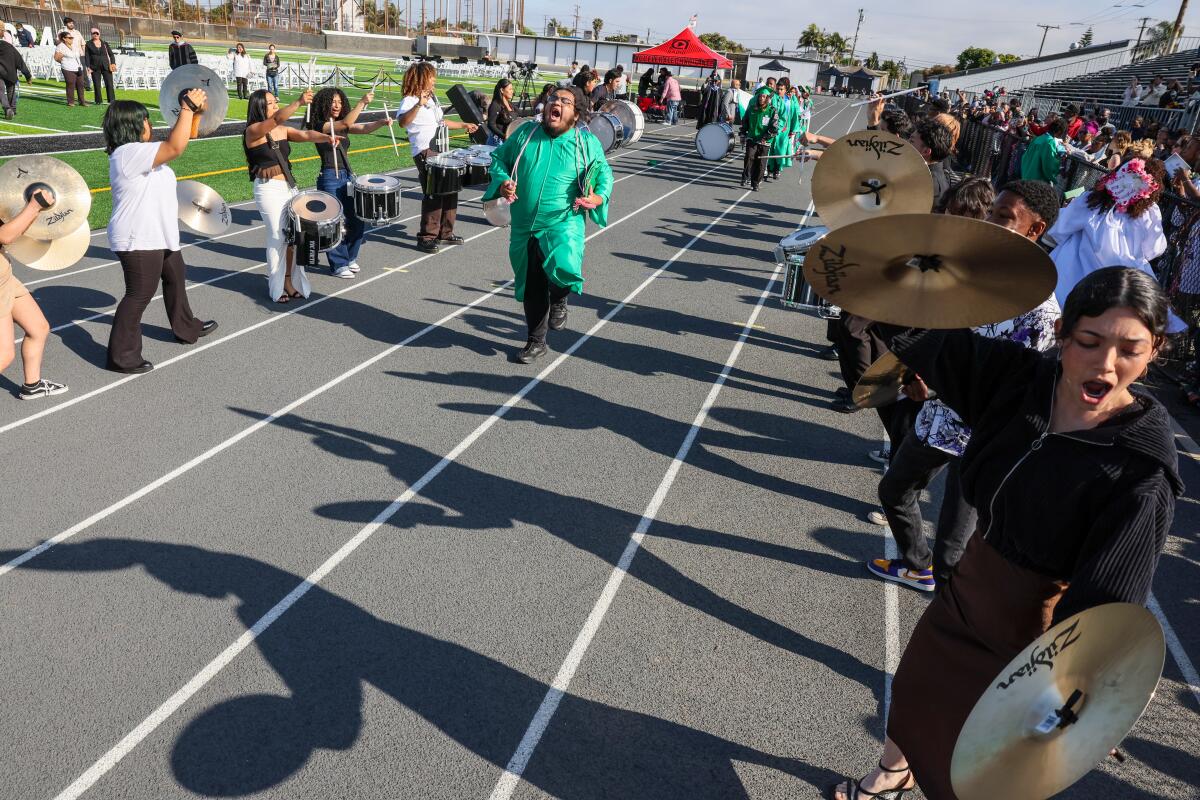These artists want L.A.’s accessible fruit to be eaten. So they created a map to guide you to them.
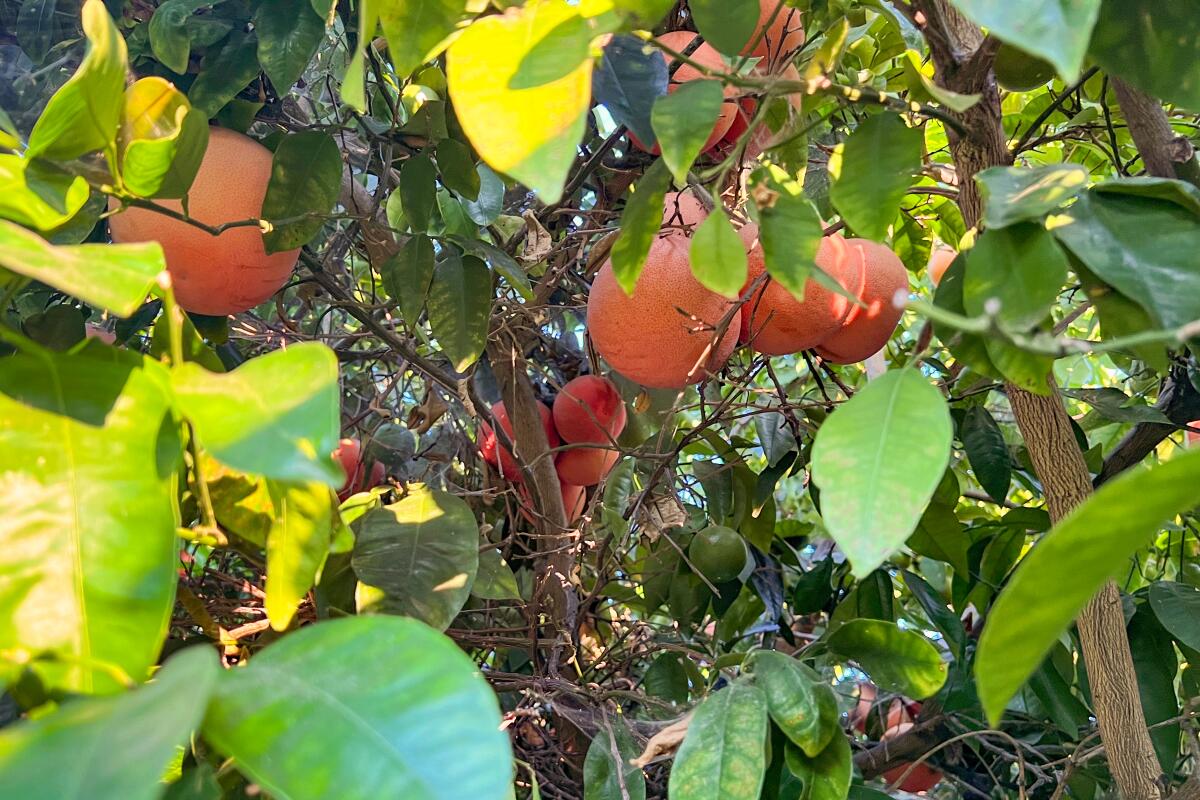
Good morning, and welcome to the Essential California newsletter. It’s Saturday, August 3. I am Jeanette Marantos, a features writer at the L.A. Times. Here’s what you need to know to start your weekend:
You're reading the Essential California newsletter
Our reporters guide you through the most important news, features and recommendations of the day.
You may occasionally receive promotional content from the Los Angeles Times.
- Fruit trees are all over L.A. These artists made a map to guide you to them.
- Dangerous fire weather is expected across much of California, marking August’s first heat wave.
- Hosting a guest who wants to hike? Here are 17 L.A. trails for every type of visitor.
- And here’s today’s e-newspaper
Picking the not-so-forbidden fruit
Earlier this year, we asked readers whether it’s ever OK to take fruit from someone else’s tree. Roughly half of the 800 people who responded came down in favor of helping themselves to fruit hanging into a public area, like a sidewalk or street. Only 19% answered with a hard no. Their position was pretty much, “My tree, my fruit, even if it’s hanging in a public space.”
For those people, artist David Allen Burns, co-founder of the nonprofit fruit mapping project Fallen Fruit, has a provocative question:
Can we really “own” trees?

“I promise you won’t be living 100 years from now,” Burns said, “but that tree will still be here, so now what?”
Moreover, a healthy fruit tree will produce thousands of pounds of fruit over our lifetimes, Burns said. “How much of that can you really eat?”
Burns and fellow co-founders Austin Young and Matias Viegener started their Fallen Fruit project back in 2004.
The artists then lived in Silver Lake (Burns has since moved to Lake Arrowhead). “When we started paying attention, we learned there are over 100 fruit trees in five city blocks [in Silver Lake] being ignored, not picked or cared for, while people were getting in their cars and driving to Whole Foods or Trader Joe’s to buy fruit from another country,” Burns said. So they drew a map, without specific addresses, that indicated the locations of many types of fruit in their neighborhood.
They didn’t include fruit growing within the boundaries of a yard — only fruit hanging in public areas, said Young. If you have to reach into someone’s yard to pick the fruit, that’s trespassing, he said.

Over the last 20 years, Fallen Fruit has created public orchards around the world, including the Monument to Sharing of 32 Valencia orange trees at the Los Angeles State Historic Park in Chinatown. They’ve passed out hundreds of fruit trees for people to plant so their fruit is at least partially accessible to the public.
And they created the Endless Orchard, an interactive map identifying locations of publicly accessible fruit, one of several fruit foraging sites that map publicly accessible fruit, such as Fruitmap, based in Poland, and Falling Fruit, based in Boulder, Colo.
So what’s it like to be on a fruit map?
I checked in with about a half dozen people in the San Fernando Valley. None of them knew about the fruit map and most didn’t want to talk about people who might be picking their easily accessible fruit.
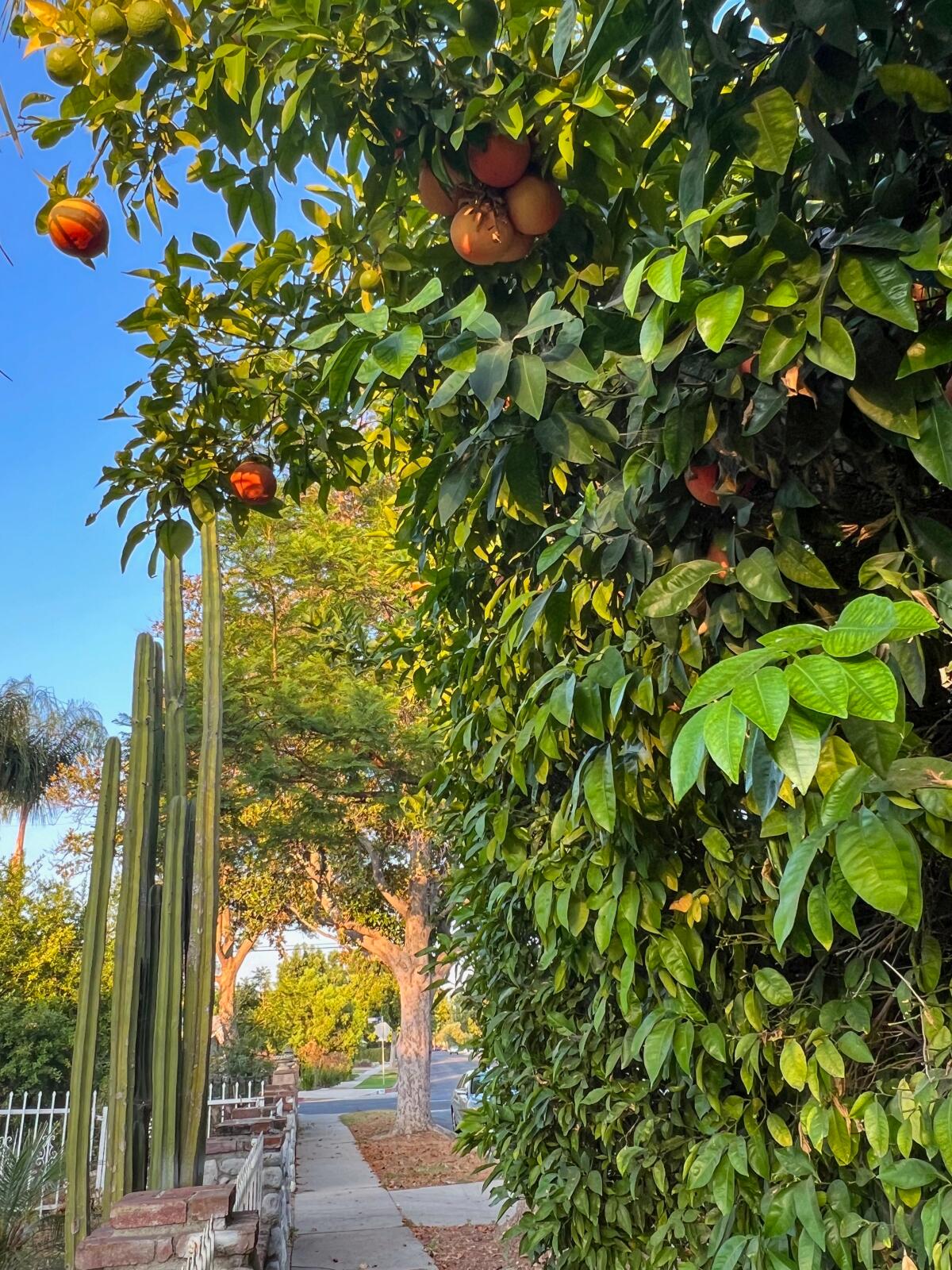
In Lake Balboa, however, Tony Sinicropi, a.k.a. Tony Rockwood, a graphic artist and clothing designer, said he doesn’t mind sharing the fruit off his massive orange and grapefruit trees that grow in the parkway outside his home. The trees produce prolifically, which is handy since the lower branches are picked clean of ripe fruit. But Sinicropi doubts the pickers are consulting a map; he thinks they most likely live, work or go to school nearby.
He’s fine with neighbors picking his fruit, Sinicropi said, but he would prefer strangers ask first, and then only take a few at a time. His biggest gripe is the garbage people leave around his trees, but making a map of fruit locations? “That’s probably a bad idea,” Sinicropi said, “because you can’t trust people.”
Burns disagrees. Fallen Fruit’s motto is take what you need and leave some for others. It also encourages asking permission, if only to make a connection, and maybe even a friendship. “What’s wrong with being friendly?” he said.
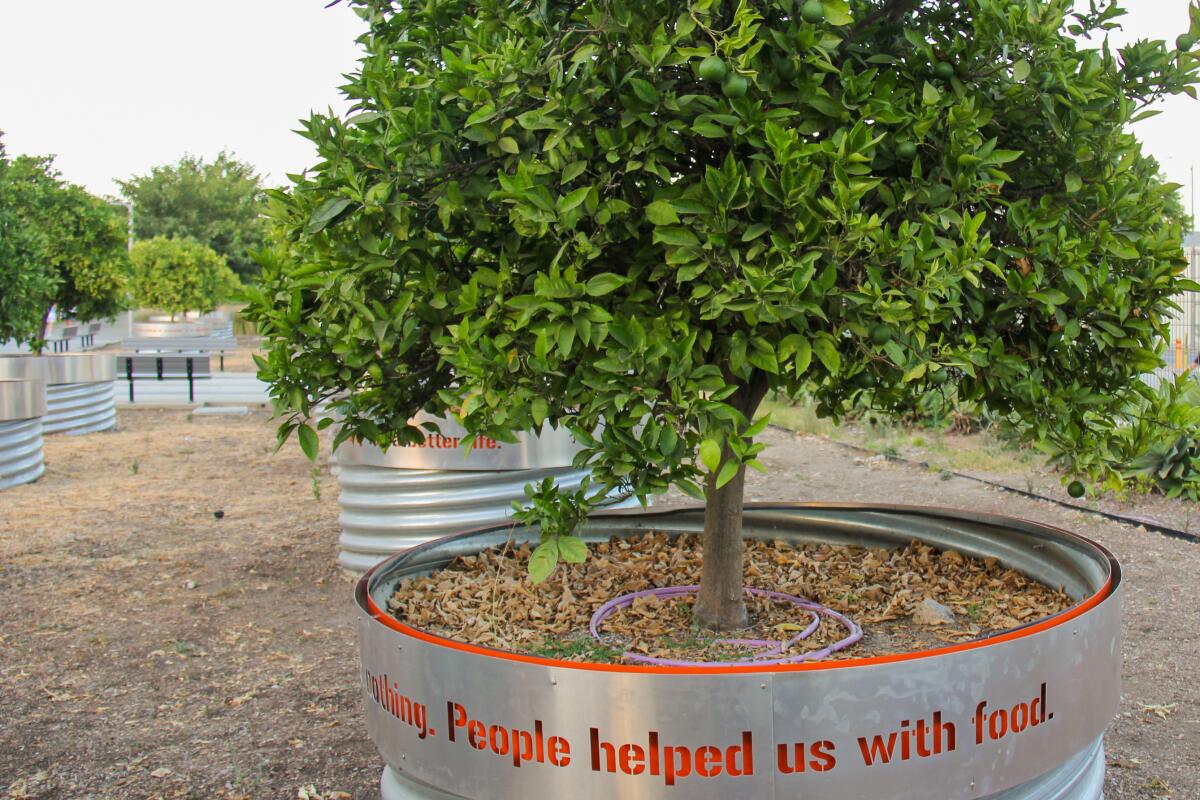
Ultimately, most people want to share, Burns said. “I was raised that if you have something, you break it in half and share it.”
At the end of our conversation, Sinicropi urged me to take as many grapefruits as I wanted. I found two plump fruit on the ground and squeezed them that evening. The juice was perfect; tart, refreshing and all the sweeter for being a gift.
This is a shortened excerpt of the August edition of the L.A. Times Plants newsletter, which also offers monthly gardening and plant events. Sign up to get it in your inbox on the first of every month.
More on picking fruit
- When is it OK to pick someone else’s fruit tree? We asked and sparked a tense debate.
- Why do Los Angeles yards have so many fruit trees?
The week’s biggest stories
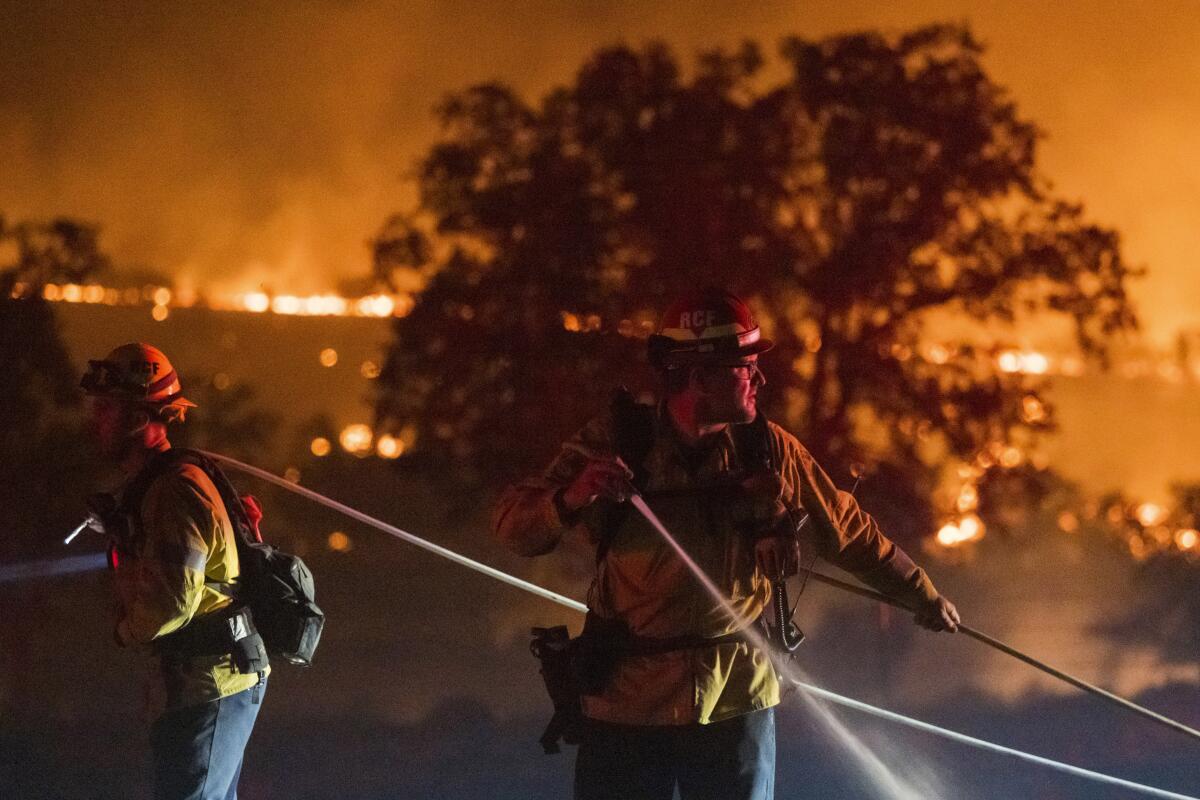
Wildfires and excessive heat
- Dangerous fire weather is expected across much of California as temperatures are expected to rise over the next few days, marking August’s first heat wave.
- Firefighters worry heat and thunderstorms could fuel the already massive Park fire.
Election 2024
- Kamala Harris secures enough Democratic delegate votes to be nominee, Democratic committee chair says.
- What Harris’ California healthcare battles might signal for hospitals if she wins in November.
- With $310 million, Harris raised more than twice as much as Trump in July.
- Tired of text spam from political fundraisers? Here’s what to do.
Paris Olympics
- Olympic boxing controversy sparks fierce debate over inclusivity in women’s sports.
- Simone Biles’ memo to Trump: ‘I love my black job.’
- How Suni Lee overcame kidney diseases to go from bedridden to Olympic medalist.
- Tom Cruise reportedly to end Paris Olympics with epic stunt to pass the torch to L.A.
- China’s swimming doping controversy is making waves at Paris Olympics — and in Washington.
Wildlife
- Wildlife rescuers are reporting an uptick in diseased sea lions along California’s Central Coast.
- A renewed bid to protect burrowing owls is advancing. What changed?
More big stories
- With COVID surging in California, is it time to bring back masks and hand sanitizer? Here’s what experts say.
- Huntington Beach mayor wants city to oppose state law barring schools from forcing teachers to out students.
- Chevron, the oil giant born in California 145 years ago, is moving to Texas.
- Gas was cut off at a Rancho Palos Verdes neighborhood hit by landslides. Electricity may go next.
- The fight to save L.A.’s Little Tokyo before it’s too late.
- Police arrested hundreds of pro-Palestinian students in L.A. The fallout continues.
- Unemployment rises again in July, reviving worries of a recession.
Get unlimited access to the Los Angeles Times. Subscribe here.
Column One
Column One is The Times’ home for narrative and longform journalism. Here’s a great piece from this week:
This high school marching band ‘represents the soul of Inglewood.’ Inglewood High’s marching band was one of the best around, but during the pandemic it cratered. Here’s how school officials and a new band leader brought it back.
More great reads
- 100 degrees then hail in August? All in one 66-mile drive to and from L.A.
How can we make this newsletter more useful? Send comments to [email protected].
For your weekend
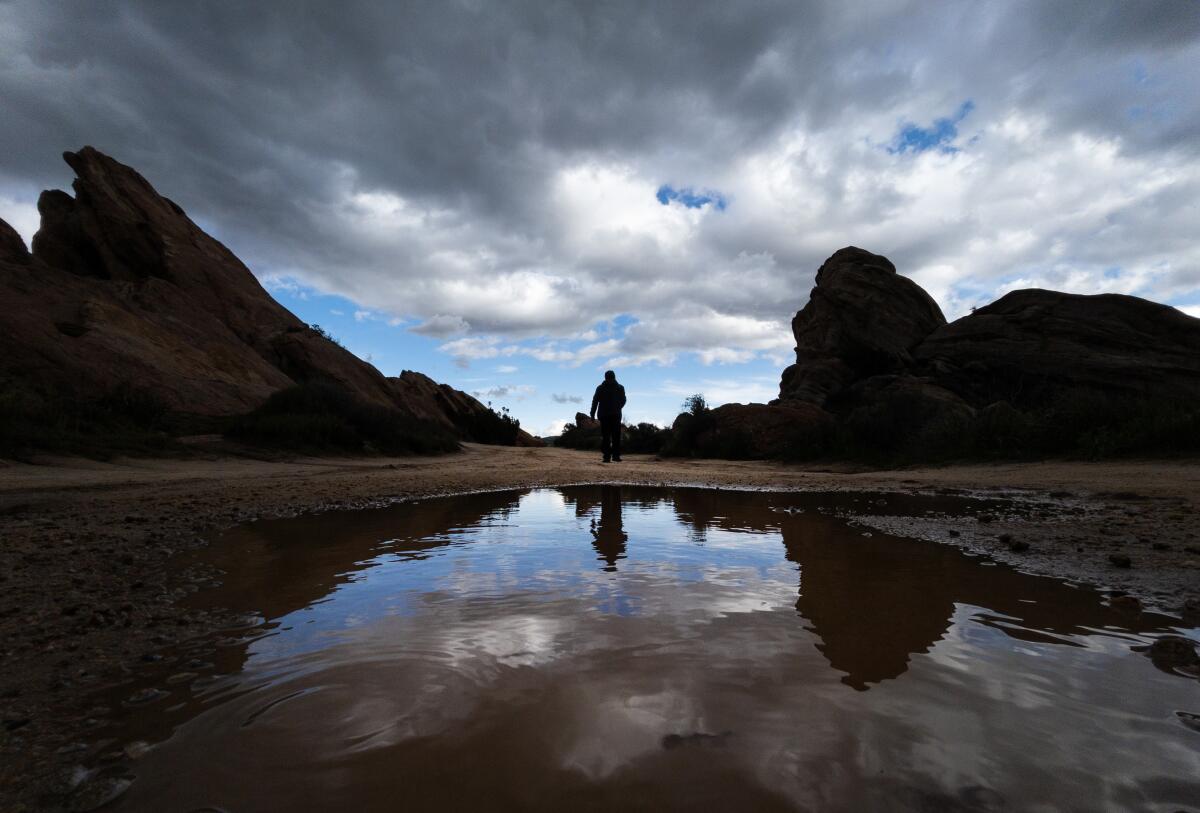
Going out
- 🥾 Hosting a guest who wants to hike? Here are 17 L.A. trails for every type of visitor.
- 🌊 10 L.A. staircase walks with breathtaking ocean views.
- 🤓 The 22 best spots to nerd out in L.A.
Staying in
- 🥇 How to watch every event at the Paris Olympics.
- 🧑🍳 Here’s a recipe for Brothy Shrimp Meatballs With Sungold Tomatoes.
- ✏️ Get our free daily crossword puzzle, sudoku, word search and arcade games.
How well did you follow the news this week? Take our quiz.
“Deadpool & Wolverine,” which took the top spot at the box office last weekend, co-stars Ryan Reynolds alongside which actor? Plus nine other questions from our weekly news quiz.
Have a great weekend, from the Essential California team.
Check our top stories, topics and the latest articles on latimes.com.
Sign up for Essential California
The most important California stories and recommendations in your inbox every morning.
You may occasionally receive promotional content from the Los Angeles Times.
